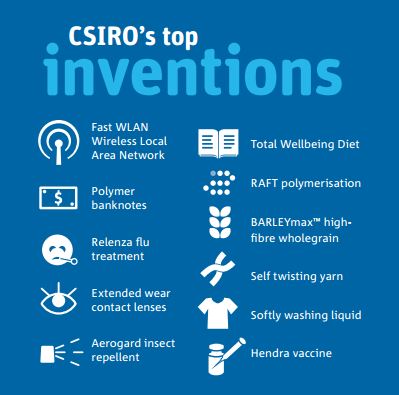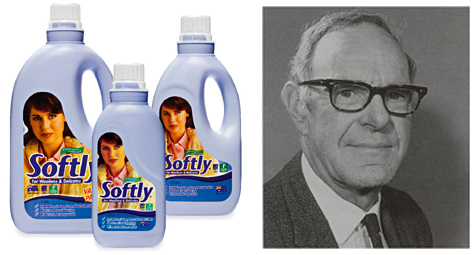We’ve written before about why we love science and even the awesomeness of plants. While we get excited about what science and technology has done for us, many take innovations that improve their daily lives for granted. Occasionally I fall into the latter category.
This is why, until recently, I dismissed the vital importance of fabric softener.
There are many ways the work of CSIRO, over our 88 years of research and development, has improved your day to day life: handy reference graphic below. As I’ve used this handy reference graphic in my work, one icon has always baffled me. Softly. The washing liquid. Sure it makes me want to rub my face all over my towels, but how could some detergent be one of the top ten inventions of Australia’s national science agency?
Seriously, who cares about fabric softener?
Inventions à la CSIRO: From the plastic banknotes in your pocket to the WiFi in your devices.
As many before me, I experienced an epiphany last week while browsing the pages of CSIROpedia.
“Softly® detergent was developed as result of claims that woollen blankets harboured disease because they couldn’t be laundered at high temperatures.”
Oh. It’s about more than scratchy cardigans.
As the story goes, in the 1950s a medical journal claimed woollen blankets could harbour disease that could be carried through the wards of hospitals. Staff at Royal Melbourne Hospital urged their Board to change to cotton blankets. Realising this could have serious impacts on the wool industry, the Chairman of the Board asked us to help.
And we got to work: testing the distribution of bacteria in fibres in hospital wards and looking at the durability of various blanket types (wool was the clear winner, surviving 300 washes compared to cotton at 150 or less). While it wasn’t confirmed that the blanket fibres carried bacteria, it was still necessary to find a way to sterilise wool.
Working wonders with wool. Softly and the man behind it, Tom Pressley.
From there Softly was born, a pH neutral dream boat in the world of detergents. Shrinking or scratchy wool was an itch of the past. And the pH is important: the detergent holds the fibre particles suspended in water, coats them with a thin layer of conditioner, but stays chemically neutral so the wool isn’t damaged by boiling.
The Royal Melbourne Hospital’s blankets were clean, disease free and oh so fluffy.
It’s so softly. Image: Flickr/ynaka29
And Softly’s impact didn’t stop in hospital wards. It’s still available on supermarket shelves today and is recommended to clean and soften wool, silks, fine cotton and linen.
As you rug up for winter over the next few weeks, remember all the fabulous things science has done for your everyday life. As I launder, I certainly will be.





30th September 2016 at 11:24 pm
Interesting. I have read that the coating that fabric softners leave behind makes the fabric wear out more quickly. I’d like to know if this is true.